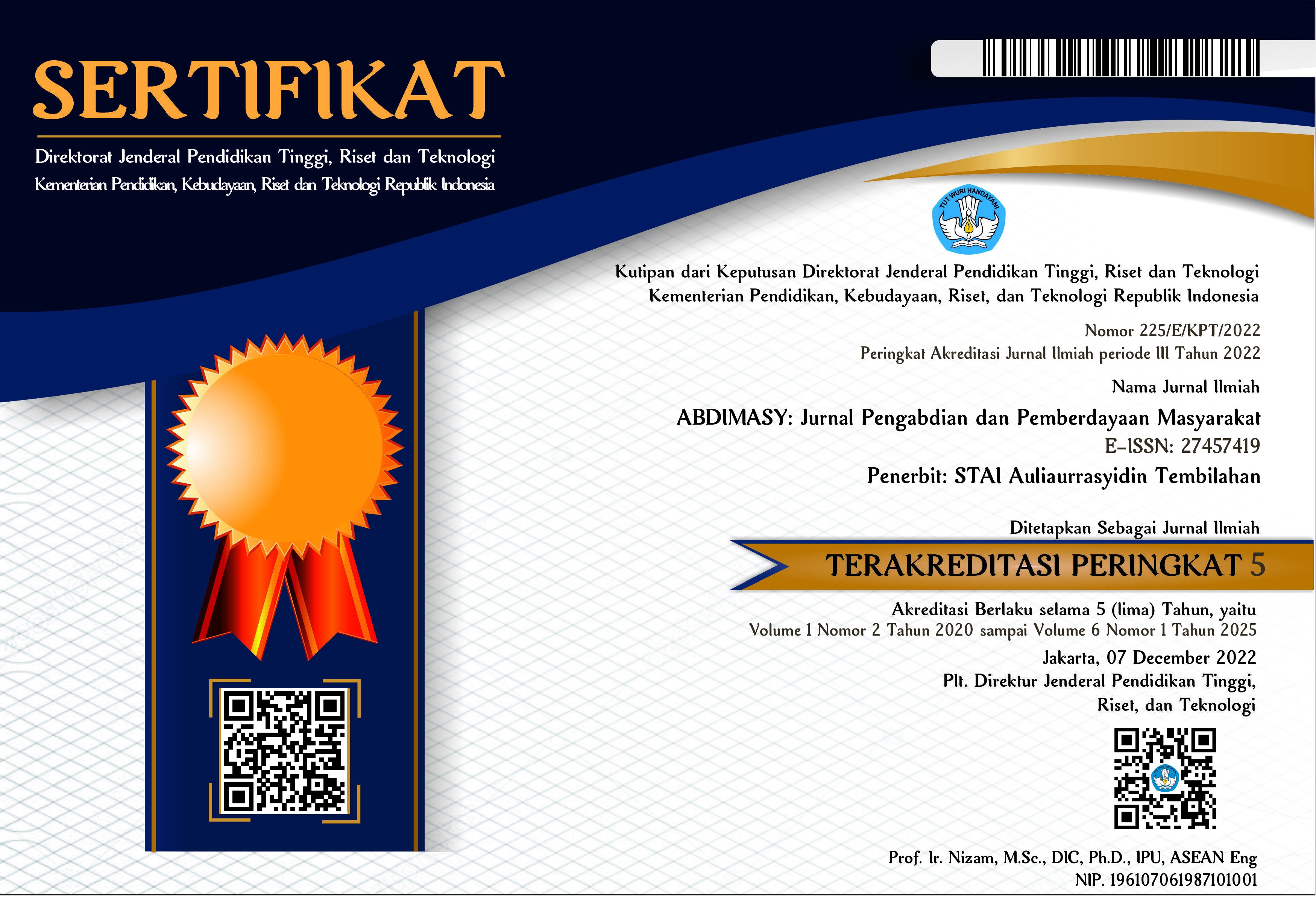Pelatihan Manajemen untuk Peningkatan Kualitas Pengelolaan Taman Pendidikan Al-Quran
DOI:
https://doi.org/10.46963/ams.v2i2.416Keywords:
Kualitas, TPQ, Manajemen TPQ, PelatihanAbstract
Al-Quran Education Park (TPQ) is one of the places to learn that is spread in almost all parts of Indonesia. Especially for Malang and surrounding areas, the management of TPQ is still not optimal, for example TPQ in Mojosari Village, Gambiran, Kepanjen District, Malang Regency. Management that has not reached the good category needs a helping hand from the UM abdimas team, considering the UM RENSTRA which wants to realize the downstreaming of science and research results. The Abdimas team consisting of lecturers across faculties, apart from having experience in research and service, also has a real role in their respective regions regarding TPQ and takmir. The undoubted competence of the team and the additional composition of students are expected to assist the implementation of management training activities at partner TPQ. Management training is expected to improve the quality of TPQ management from several aspects, namely: finance, programs, and governance. This activity is carried out using training methods (knowledge and skills) which are carried out in a structured and periodic manner. Each activity evaluates (measures) the achievement/success of the Abdimas program. Questionnaires are provided as data collectors for final analysis. In general, activities have been running smoothly and the public is quite satisfied with the index reaching 0.75.
Downloads
References
Burde, D., Middleton, J. A., & Wahl, R. (2015). Islamic studies as early childhood education in countries affected by conflict: The role of mosque schools in remote Afghan villages. International Journal of Educational Development, 41, 70–79.
Indrawati, N. K. (2014). Management by Inspiration: Implementation of Transformational Leadership on Business at Pondok Pesantren*) Sunan Drajat. Procedia - Social and Behavioral Sciences, 115, 79–90.
Jamelaa Bibi Abdullah Jainabee Md Kassim. (2011). Instructional leadership and attitude towards organizational change among secondary schools principal in Pahang, Malaysia. Procedia - Social and Behavioral Sciences, 15, 3304–3309.
Jonathan M.B. Stern, T. M. S. (2016). Private secondary schools in Indonesia: What is driving the demand? International Journal of Educational Development, 46, 1–11.
Kemenag. (n.d.-a). No Titles. https://kemenag.go.id/file/dokumen/PP5507.pdf
Kemenag. (n.d.-b). No Titles. http://pendis.kemenag.go.id/file/dokumen/bukusaku1102.pdf
Malang, R. (n.d.). No Titles. https://radarmalang.id/di-kabupaten-ada-4-251-tpq-dan-2-046-madin/
Permani, R. (2011). The presence of religious organisations, religious attendance and earnings: Evidence from Indonesia. The Journal of Socio-Economics, 40(3), 247–258.
Downloads
Published
Issue
Section
License
Authors who publish with this journal agree to the following terms:
1. Copyright on any article is retained by the author(s).
2. The author grants the journal, right of first publication with the work simultaneously licensed under a Creative Commons Attribution shareAlike 4.0 International License that allows others to share the work with an acknowledgment of the work’s authorship and initial publication in this journal.
3. Authors are able to enter into separate, additional contractual arrangements for the non-exclusive distribution of the journal’s published version of the work (e.g., post it to an institutional repository or publish it in a book), with an acknowledgment of its initial publication in this journal.
4. Authors are permitted and encouraged to post their work online (e.g., in institutional repositories or on their website) prior to and during the submission process, as it can lead to productive exchanges, as well as earlier and greater citation of published work.
5. The article and any associated published material is distributed under the Creative Commons Attribution-ShareAlike 4.0 International License





2.png)



